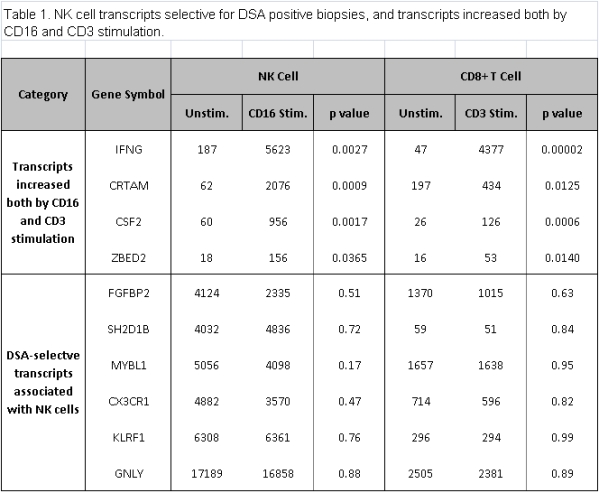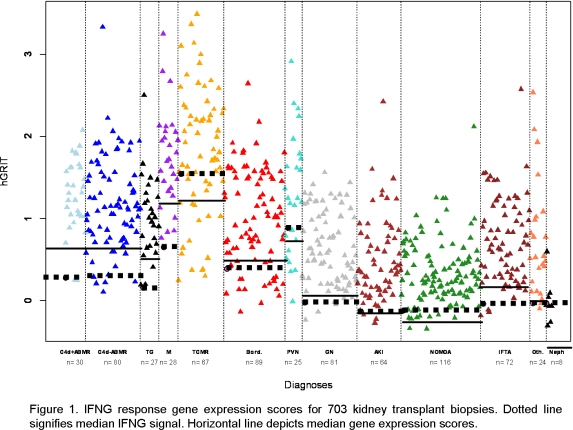Cognate Events in Antibody- Vs. T Cell-Mediated Rejection: A Molecular Perspective
1Department of Medicine, University of Alberta, Edmonton, AB, Canada
2Department of Laboratory Medicine & Pathology, University of Alberta, Edmonton, AB, Canada.
Meeting: 2015 American Transplant Congress
Abstract number: A17
Keywords: Alloantibodies, Graft failure, HLA antibodies, T cell activation
Session Information
Session Name: Poster Session A: Acute Allograft Rejection
Session Type: Poster Session
Date: Saturday, May 2, 2015
Session Time: 5:30pm-7:30pm
 Presentation Time: 5:30pm-7:30pm
Presentation Time: 5:30pm-7:30pm
Location: Exhibit Hall E
AIM: The cognate event in antibody-mediated rejection (ABMR) is NK cell FcR engagement; T cell mediated rejection (TCMR) uses TCR engagement. Understanding the molecular changes behind these cognate events will enhance understanding of the pathology in each type of rejection. To model this we examined gene expression changes in CD16-stimulated NK cells and CD3-stimulated T cells vs. unstimulated controls.
METHODS: We purified primary human NK cells and CD8+ T cells from PBMCs by immunomagenetic selection and stimulated them through CD16 or CD3, respectively (N=3 stimulated and unstimulated for each cell type). Gene expression changes were assessed at 4 hours post-stimulation for both.
RESULTS: We examined transcripts increased >2X by CD16 or CD3 stimulation vs. unstimulated controls (p<0.05). Our analyses showed considerable qualitative overlap between NK cell FcR engagement and T cell CD3-stimulation. Quantitatively, 15 transcripts were specific to CD16-stimulated NK cells. Four transcripts, most notably IFNG, were increased in both stimulated T cells and NK cells (Table1). The transcripts specifically induced in NK cells were not selectively associated with ABMR biopsies. Expression of 6 previously described NK transcripts selectively expressed in ABMR was not altered by NK cell FcR stimulation, indicating they may be constitutively expressed in NK cells. When examined across diagnostic categories (Fig.1), IFNG was modestly increased in ABMR yet IFNG effects were strongly induced in biopsies with ABMR.
CONCLUSIONS: Our data suggest that NK cell FcR stimulation and T cell CD3 stimulation both induce common gene expression changes with small quantitative exceptions. Thus, cognate antigen recognition in ABMR involves IFNG expression but is best represented by IFNG effects.


To cite this abstract in AMA style:
Parkes M, Halloran P, Hidalgo L. Cognate Events in Antibody- Vs. T Cell-Mediated Rejection: A Molecular Perspective [abstract]. Am J Transplant. 2015; 15 (suppl 3). https://atcmeetingabstracts.com/abstract/cognate-events-in-antibody-vs-t-cell-mediated-rejection-a-molecular-perspective/. Accessed February 10, 2026.« Back to 2015 American Transplant Congress
